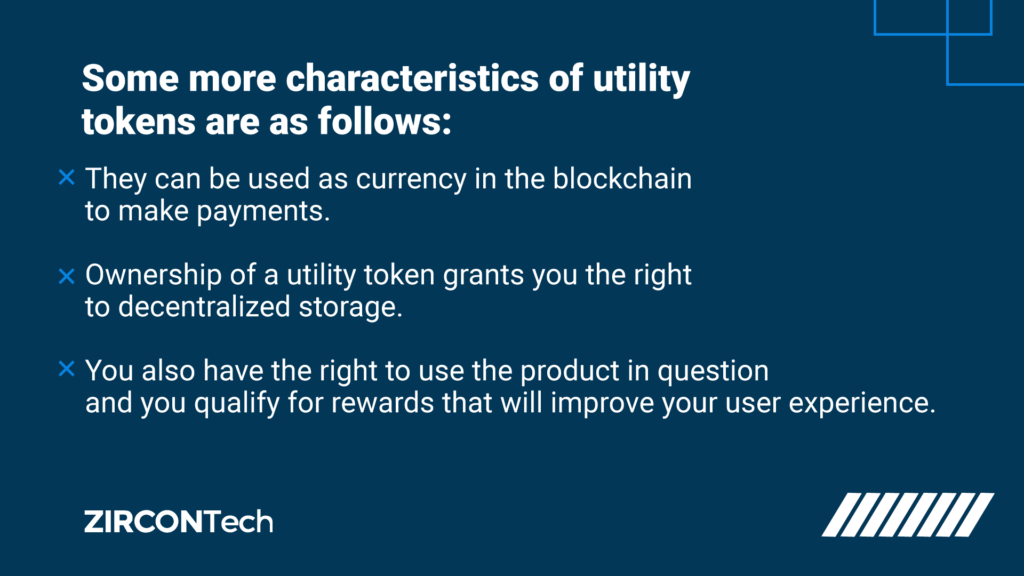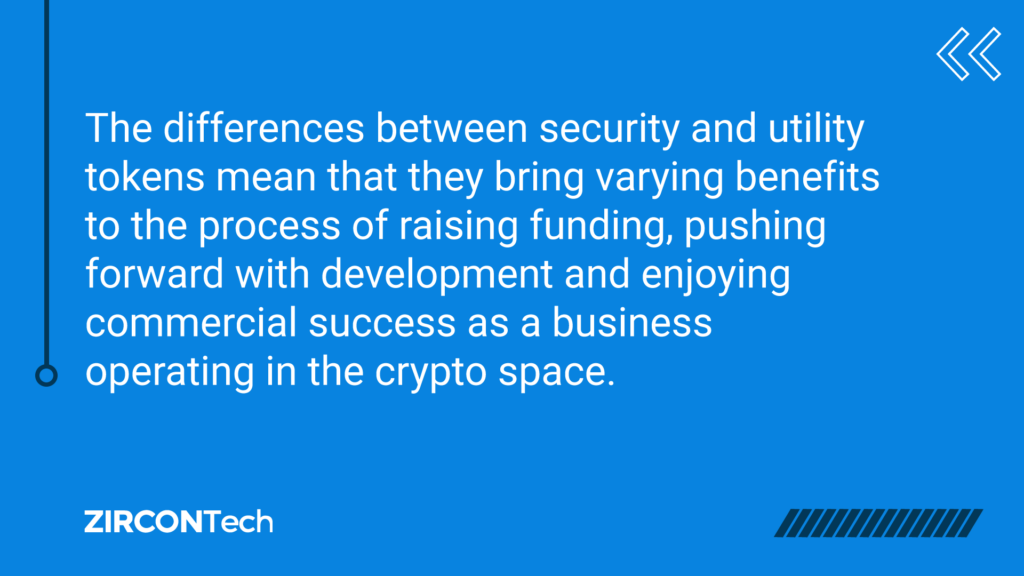The world of cryptocurrencies is full to the brim with technical terms that can appear extremely baffling to people who are new to this digital dimension. Even those who have spent some time in the metaverse can find the constant barrage of new terminology challenging. Do you know the differences between Utility Token vs Security Token?
This situation is particularly prevalent when it comes to the question of tokens. The concept of tokens is at the heart of the crypto world, after all. This is how its occupants relate the properties they hold in the sphere of blockchain technology to the real world and actual value. So it is especially important that you understand the difference between the various types of tokens that exist in this space.

For instance, one term that has become relatively common parlance in the traditional world of business and commerce is the non-fungible token (NFT). We have written extensively about NFTs elsewhere, and you are welcome to check out our guides to this fascinating area of cyberspace.
However, in this blog we are going to address two other types of tokens – utility tokens and security tokens. We’ll be answering the following questions:
- What is a utility token?
- What is a security token?
- What is the difference between security and utility tokens?
This will help you to understand the significant differences between utility token vs security token. It’s extremely important to understand those differences and the functions performed by each type of token.
ZirconTech brings a high level of expertise to questions such as “What is a security token?” We provide a knowledgeable consultancy service on all aspects of blockchain technology so that our partners can move forward with confidence towards their software development aims and overall commercial targets.

What is a Utility Token?
Let’s start by defining exactly what a utility token is. Like all other tokens, it is a property that relates to a certain value or asset. In this particular case, a utility token is an item distributed during Initial Coin Offerings, or ICOs – we’ll take a more detailed look shortly at what exactly an ICO is.
The best way to think of a utility token is as a digital coupon. It is created by a company that is engaging in an ICO and the understanding is that the utility token can be used in the future as a means of qualifying for discounted fees or special access to a product or service.
You may qualify for special services or another form of preferential treatment, like a discount when a software package is launched.
The key difference between a utility token vs a security token is that a utility token is not viewed as an investment in the company concerned. We will talk in the next section about the precise definition of a security token. Utility tokens should be seen as a promotional item rather than a property that gives you a stake in the company concerned.

If the privileges your token represents become highly prized as time goes by, your utility token can rocket in value. For instance, if it is effectively a coupon that grants you limited access, people who did not take part in the ICO might clamor to have such access if it becomes clear that there is a good deal to be had around this product.
However, you should be aware that there is no natural mechanism around a utility token for increasing its value. That value can vanish completely if the project does not succeed – and you could be left holding a worthless token if the scheme in question does not leave the ground. The main negative around utility tokens, however, is that owning one does not give you any decision-making rights.
What is a Security Token?
The easiest way for people with limited exposure to the world of cryptocurrencies and blockchain technology to understand what is a security token is to think of such tokens in the same way as securities in traditional financial markets.
A security token means that you hold a small share in the company that issues the token. You are effectively an investor in that company – and that in turn grants you a say in the future decision-making of the enterprise concerned. As you can see already, this is the most significant difference between a security and a utility token.
There is more regulation around security tokens. Their issue is subject to federal laws over securities – if the company does not comply with those laws, it could lead to the early closure of the project development in question. In the United States, security tokens are regulated by the SEC because they represent a specific investment.
Issuing security tokens enables a company to sell stock in digital form. Given the way traditional stock markets operate, security tokens represent a bridge between the mainstream financial landscape and cryptocurrencies. People who own non-crypto assets can use them to sell small fractions to others who want to increase and diversify their crypto holdings.
The fact that ownership of a security token grants you a small share in the company concerned means that, if that business makes a profit, you qualify for a dividend in the form of additional coins.
We should mention that there is another form of token in this context, the equity token. These are an application of Ethereum-based smart contracts, and they allow start-up businesses to raise funds by offering shares in their company in token form.
However, while they are similar to security tokens, there is less regulation around equity tokens. This makes many smaller firms less willing to use this as a way of selling their stock.
How Does an ICO Work?
At the core of our understanding of what is a security token, what is a utility token, and the difference between a security and utility token, are the processes known as Initial Coin Offerings.
The owners of start-up businesses, and the investors who back them, use an ICO to generate funding from the wider public. That money can then be used in turn by the company’s developers to support the creation and launch of new projects and services. In return for that influx of new money, anybody who invests receives tokens as a reward for their faith and generosity.
The tokens issued have a particular value that equates to a certain amount of one of the many cryptocurrencies now available. However, you have to wait for all the security checks to be completed before the security tokens are distributed.
If you are an experienced investor in traditional stock markets, you can think of an ICO as being equivalent to an IPO – an Initial Public Offering. This is the first opportunity that public investors have to buy shares in a company. The structure of an ICO is very similar, as is the purpose – to raise money to fund future development and progress.
As part of Initial Coin Offerings, both security tokens and utility tokens may be issued to the new investors, depending on the nature of the investment they are making in the company concerned.
What is the Difference Between Utility Token vs Security Token?
By now, it should be clear that there are some obvious differences between these two types of token we are discussing. If you are asking: “What is a security token?” one of the best methods of defining it is by emphasizing the way in which it differs from a utility token.
A utility token is a coupon, a voucher that may bring further benefit to you down the line in terms of an ability to use the product in question on preferential terms. There is less value in a utility token; the main reason for this is that you have no actual stake whatsoever in the company in question and, therefore, no power to make a contribution to the strategy that will guide its future.
This is the major contrast with security tokens. A security token gives you a small stake in the company in question. The future performance of this business will make a financial difference to you, particularly if it turns out to be an enormous success and the value of your stake rises impressively. Rather than being an interested spectator, with a security token you have part ownership of a contract and, thus, some skin in the game.
People sometimes ask if Bitcoin, the most popular and best-known of cryptocurrencies, is a utility token. Ultimately, a cryptocurrency is a medium of exchange that holds a particular value – much like a traditional currency. A utility token, in contrast, is a non-cash coupon that relates to an identified purpose and does not hold any intrinsic currency value.

The Benefits of Utility Tokens and Security Tokens

There are several specific benefits to security tokens and the processes by which they are issued. These include:
- Accessibility: If you want to float your company on a traditional stock exchange, this can be a drawn-out and stressful process. It also tends to be the preserve of large organizations that are worth large sums of money already. You can run Initial Coin Offerings, in contrast, for much smaller companies in a much speedier way. Not only is the process quicker, but it can also be applied to much smaller products and projects, which means the bar for entry to the process of floating, and issuing security tokens is far lower.
- Flexibility: Not only is the process of attracting new investment and issuing security tokens much more streamlined, you can also push ahead and make decisions over the company’s future much more quickly.
- Global appeal: You are not tied to the fortunes of a stock exchange in one company; your security tokens can be traded with people all over the world in a much more frictionless way – which is, of course, one of the wider reasons why cryptocurrencies have attracted so much interest in recent years.
- Compliance: Following regulations can be hard-wired into your security token thanks to the standards followed by blockchains such as Ethereum and baked into their blockchain technology. This is an area where the extra flexibility and the borderless nature of cryptocurrencies can be a significant benefit – although the actual security regulations remain complex.
How can ZirconTech help you?
We hope that you now have a far greater understanding of the answers to the questions, What is a security token? and What is a utility token? And, crucially, that you understand the significant differences between them in terms of their purpose, the way they operate, and the benefits they bring to their respective owners.

Nevertheless, if you have any remaining issues around the difference between security and utility tokens – or need a software development partner that can help you to create, deliver and implement a project that has tokens associated with it – contacting ZirconTech is an ideal next step for you.
We are incredibly adept in all areas of blockchain technology. We have used our expertise to benefit companies across the United States and in many other nations. If you need our consultancy advice, please get in touch now.